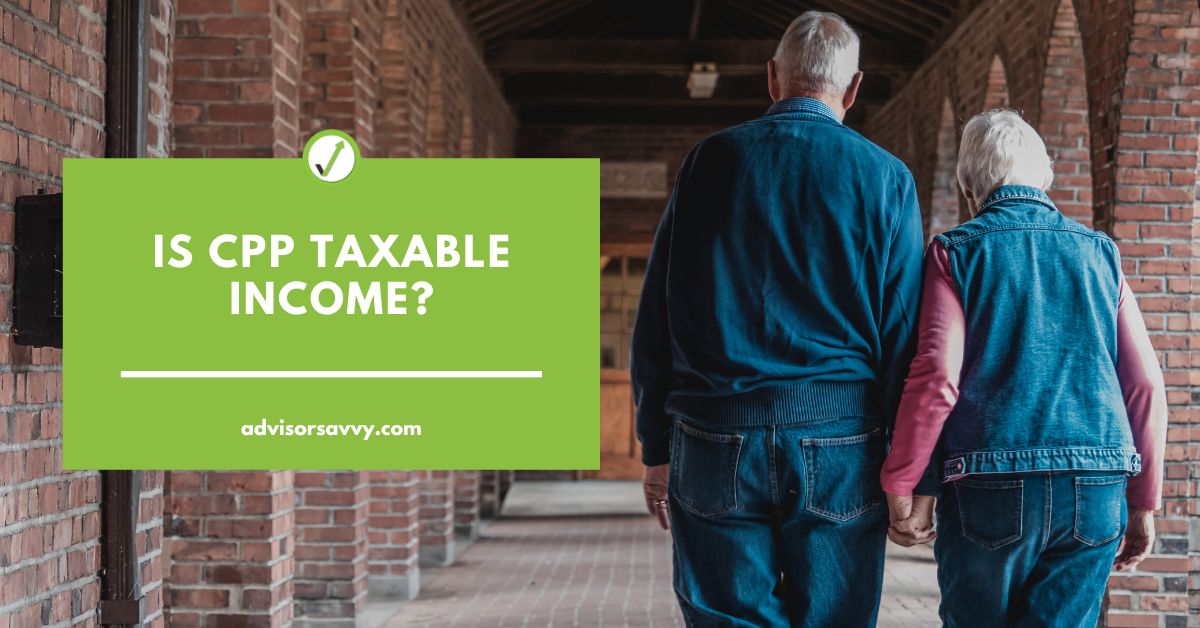
The Canada Pension Plan (CPP) is a national program that provides retirement benefits to Canadians. The CPP is funded by contributions from both employees and employers, in addition to contributions from the self-employed. It offers various types of payments, including a retirement pension, disability benefits, and death benefits. If you receive benefits from CPP, you may be asking yourself, is CPP taxable income? The answer is yes, CPP benefits are taxable, but there may be ways to reduce your tax liability on the payments you receive. Read on to learn more about how CPP is taxed and what steps you can take to minimize the impact of taxes on your benefits.

Table of contents
What is CPP?
The Canada Pension Plan (CPP) program originally started in 1965 to combat poverty among retired Canadians at the time. Since then, it has evolved and changed to adapt to modern needs. When the program first started, it relied solely on contributions from employees, employers and the self-employed. Today, the plan is large enough to earn investment income, while still taking in contributions.
CPP is a monthly, taxable benefit that replaces part of your income when you retire. The amount of the CPP pension is based on your earnings and how long you contributed to the plan. You can begin receiving your CPP as early as age 60 or as late as age 70.
The main benefit under the CPP program is the retirement benefit. This is because any Canadian who has worked in Canada and contributed is eligible for the benefit when they retire. However, CPP also offers the following benefits:
- Post-retirement benefits. A benefit paid to individuals aged 70 or older who continue to work while receiving CPP.
- Disability pension. A monthly benefit for individuals with a disability under the age of 65 who have contributed to CPP before.
- Children’s benefits. If you qualify for the disability pension above and have children, then your dependents are eligible for monthly CPP benefits too.
- Post-retirement disability benefits. An additional benefit for those claiming regular CPP retirement pension and have a disability. This benefit is mutually exclusive from the disability pension above.
- Survivor’s pension. A monthly benefit available to the spouse or common-law partner of a deceased CPP contributor.
- Death benefits. A one-time payment to the estate or qualified individuals resulting from the death of a deceased CPP contributor.
Is CPP taxable income?
Your Canada Pension Plan (CPP) retirement pension is considered income, and is therefore taxable. However, taxes are not automatically deducted from your monthly payments. If you would like federal income tax to be deducted from your CPP retirement pension, you can sign into your My Service Canada Account and update your tax information. Alternatively, you can contact Service Canada directly and request source tax deductions from your pension payments. Some Canadians prefer this so they don’t owe a lump sum during tax season. Either way, it is important to keep your tax information up to date in order to avoid any penalties or interest charges.
As for other CPP benefits, such as the death benefit and disability pension, these are considered taxable income too. Like the retirement pension, these benefits do not have tax deducted at the source. If the benefit in question is paid monthly, you can request source deductions be taken off the amount.
If you have questions about your specific situation, we recommend speaking to a professional accountant or financial advisor. They will be able to help you understand the tax implications of receiving a CPP pension or other CPP benefits. They will make sure you are taking advantage of all the deductions and credits you are eligible for, based on your specific circumstances.
Is CPP disability income taxable?
CPP disability benefits are taxable income. However, if this is your only taxable income, the tax implications should reduce due to the basic personal tax credit on both the provincial and federal level. In addition, you may be eligible for other tax credits and deductions, such as the disability tax credit, which can further reduce the amount of taxes you owe. It all depends on your income, tax bracket and specific circumstances.
While CPP disability benefits are taxable, there are ways to minimize the tax implications. First, you can make sure that you are taking advantage of all available tax credits and deductions. Second, you can consider investing in a Registered Disability Savings Plan (RDSP). The RDSP is a special registered plan designed for people with disabilities and their families. Contributions to an RDSP are not deductible, but the investments grow tax-free until they are withdrawn. Withdrawals from an RDSP are subject to income tax at your respective rate, and they will not affect your eligibility for government benefits or programs such as CPP disability benefits. Finally, you can speak to a financial advisor about strategies for minimizing the tax impact of your CPP disability benefits.
Is the CPP death benefit taxable?
The death benefit received from the Canada Pension Plan (CPP) is taxable income. The person or estate who receives the benefit will have to pay taxes on it. If an estate receives the death benefit, the amount will be included in the estate’s taxable income on line 19 of the trust’s T3 tax return in the year the payment is received. The tax implications vary depending on whether the death benefit was paid to an individual or estate.
The CPP death benefit is a one-time, lump-sum payment paid to the estate of a deceased contributor. The benefit is calculated based on the contributions the deceased made during their lifetime. The death benefit can be paid to a surviving spouse or common-law partner, or to the estate of the deceased contributor.
In general, any beneficiaries who receive the CPP death benefit will have to pay taxes on it. However, there may be some exceptions depending on your personal circumstances. Again, it is advisable to speak with a tax professional to determine if you are eligible for any tax exemptions.
How much income tax do you pay on CPP?
As a resident of Canada, the tax you pay varies depending on your total income, tax bracket and province or territory of residence. Keep in mind that CPP benefits are included in your total income. Using your usual marginal rate, you can roughly estimate how much tax you pay on your CPP benefits.
However, if considered a non-resident of Canada, the rules surrounding CPP benefits differ. The non-resident tax is a Canadian income tax imposed on certain CPP pension and benefit payments made to individuals who are not residents of Canada. The tax rate is 25% unless reduced or exempted by a tax treaty between Canada and the individual’s country of residence.
CPP benefits are subject to the non-resident tax, but QPP benefits are not. The amount of tax that an individual pays on CPP benefits depends on the individual’s tax treaty status. Plus, whether the benefits or pensions are considered “eligible” or “non-eligible” under the terms of the treaty.
Generally, eligible benefits and pensions face a lower tax rate than non-eligible benefits and pensions. For example, if an individual is a resident of France and receives CPP benefits, the payments would be considered eligible under the French-Canadian tax treaty and would be subject to a 15% withholding tax, rather than the standard 25% withholding tax. However, this is just an example and your specific circumstances will dictate the tax implications.
Related Reading: Top 10 Retirement Planning Tips For Canadians
Preparing for tax season
While the Canada Pension Plan is a valuable program, it is important to understand that there are tax aspects to consider. For those receiving any kind of payment under CPP, it is important to be aware of the tax implications so that you can plan accordingly. Fortunately, a statement is usually provided to you by the Canadian government which breaks down the benefits and tax deductions you incurred during the year. This makes preparing for tax season much easier!
In general, any benefit paid from CPP is taxable income. Working with an experienced accountant or financial advisor can help ensure you receive all of the benefits available to you while minimizing your tax liability.
Read More: CPP vs OAS: What are the differences?
